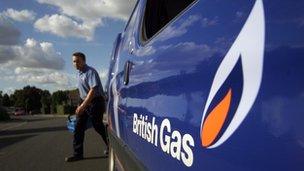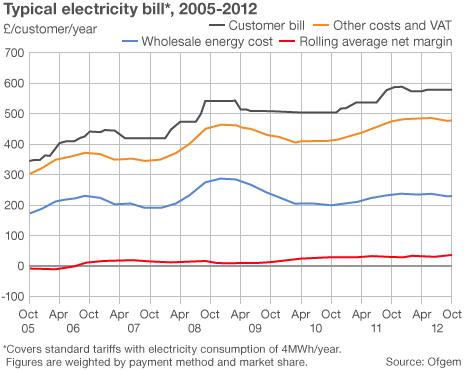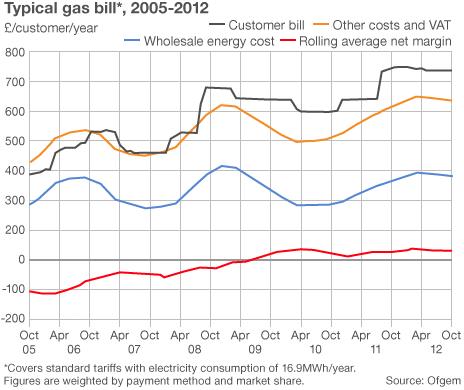British Gas raises gas and electricity prices
- Published

British Gas last raised its tariffs in August 2011
British Gas has announced increases to the gas and electricity prices it charges customers.
It has raised its charges for both types of fuel by about 6%, external, adding £80 a year to the average dual fuel bill.
Britain's biggest energy supplier said the "unwelcome" increase would come into effect on 16 November.
Its rival SSE, which trades as Scottish Hydro, Swalec and Southern Electric, has already said it will raise its prices by an average of 9% from Monday.
"We know that household budgets are under pressure and this £1.50 per week rise will be unwelcome," said managing director Phil Bentley.
"However, we simply cannot ignore the rising costs that are largely outside our control, but which make up most of the bill."
British Gas also warned that the rising cost of government energy policies was likely to add even more to household bills next year.
Rising costs
Speaking to the BBC, Richard Lloyd of consumer group Which? criticised the opacity and lack of competition in the energy market.
"What we need to see is action from the government and more pressure on... these very big lazy companies who think it's OK to clobber people with above-inflation price rises at the very time when they can least afford it," he said.
"Everybody knows that this is a market that is not competitive, not properly working for consumers.There is very little pressure on British gas to be efficient and to keep these price rises to a minimum."
Over six million households in England already plan to cut back on their heating this winter because they are worried about affording their bills, according to Audrey Gallagher of the government-sponsored watchdog Consumer Focus.
"Today's price rise will leave customers even more worried about the cost of heating their homes," she said.
British Gas last raised its tariffs in August 2011, when gas prices went up by 18% and electricity prices by 16%.
Then in January 2012, it cut its electricity prices by 5%.
The British Gas boss claimed that 85% of the price it charges customers is outside its control, including wholesale gas prices and the cost of government policies to try to reduce emissions and help the poorest households.
"Britain's North Sea gas supplies are running out and British Gas has to pay the going rate for gas in a competitive global marketplace," said Mr Bentley.
"Furthermore, the investment needed to maintain and upgrade the national grid to deliver energy to our customers' homes, and the costs of the government's policies for a clean, energy-efficient Britain, are all going up."
Phil Bentley: Investment "best way of keeping bills down"
The cost of government policies and the national grid upgrade added £50 to the average household bill this year, and is expected to add another £60 next year, British Gas said.
It said that winter wholesale prices it pays were proving to be some 13% higher this year.
Speaking to the BBC, Mr Bentley pointed out that although wholesale prices are actually currently lower than a year ago, British Gas, like most utilities, fixes the price at which it buys gas well in advance, and these fixed prices had risen.
The company reported £345m profit in the first half of the year, but the chief executive said that he expected profits to be down in the second half.
"Our margins are 5p in the pound," he told the BBC. "That 5p is going into jobs for Britain, investments in new wind farms, investments in new gasfields."

Insulation
Consumer Focus said that the government and the energy regulator should do more to protect households from the effect of growing energy costs.
"From next year, an average of £4bn will be taken from consumer bills in the form of carbon taxes," Audrey Gallacher said.
"Using a proportion of that revenue to fund a much more ambitious energy efficiency programme could start to tackle fuel poverty and provide a jump start to our energy efficiency industry."
British Gas is offering free loft and wall cavity insulation, which it said could save the average household £100 per year on their bill.
All the energy utility firms are obliged under the government's "Certified Emissions Reduction Target" (or "Cert") programme to cut the carbon dioxide output by households.
British Gas extended its offer of free insulation to non-customers earlier this year. Consumer groups said the company had done this because it risked missing targets.
Failure to hit the target each year could result in penalties from the energy regulator Ofgem, so most utilities are offering some form of help with insulation as a way of reducing the amount of gas that households burn.

British Gas claimed that customers that had already implemented energy saving measures had seen their fuel consumption drop by up to 40%, and as a result the average total fuel bills of its customers had not risen faster than inflation, despite the increases in fuel charge rates.
In addition, under the government's Warm Home Discount Scheme, energy suppliers agreed to give discounts on energy bills to older households who receive certain benefits.
Speaking to the BBC, energy minister Greg Barker said the scheme would mean two million of the poorest families would get £130 towards energy bills.
When it was launched last year, the government said it expected the four-year scheme to be worth £1.1bn and to help two million low-income households with their energy bills.
- Published12 October 2012
- Published22 August 2012